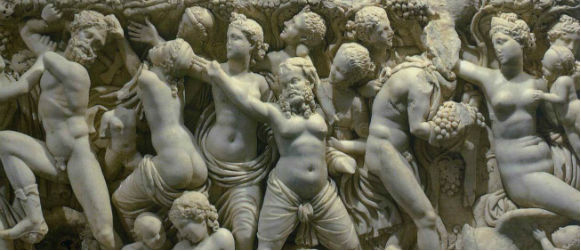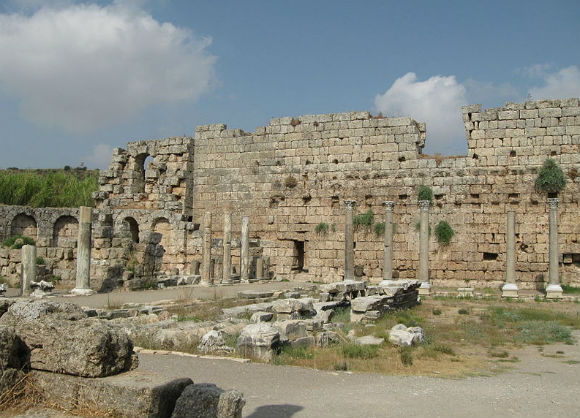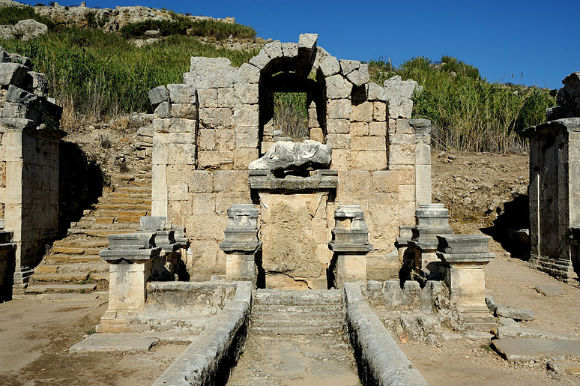Perga was an old city even in the first century. Its name (which is not Greek) indicates that its origin dates from pre-Greek times. Alexander the Great passed through it twice while the Pergaeans offered no resistance to him although it was a walled city with a citadel. In Roman times the main streets were over twenty-one meters wide. They were lined with Ionic colonnades and a water channel ran down their center in a series of small waterfalls as in Antalya today. Behind the colonnades stood the shops. Of the early buildings the stadium and the theater have survived the ravages of earthquakes and wars with the least damage. In fact this stadium which could seat about fourteen thousand people is one of the best preserved in Turkey.
The temple of the Pergaean Artemis according to a writer of the time was “a marvel of size, beauty, and workmanship.” Its location has yet to be established; it may have been where there are now ruins of a Byzantine church on a hill to the southeast of the city.
Perga is on a rise not far from the Cestrus River which was navigable In Paul’s time. It was not a seaport in terms of Its being directly on the Mediterranean even then, but rather it was more easily defended where it was: its distance from the open sea made it less vulnerable to piracy.
Two people stand out among the early residents of Perga. Apollonius was a third century B.C. astronomer and mathematician who believed that the movements of heavenly bodies in the universe were explainable by orbits within orbits: that the moon went around the earth as the earth went around the sun. He was much ahead of his time in his theories of astronomy, so much so that the ideas had to be rediscovered during the Renaissance. Plancia Magna was unusual for a second century A.D. woman: she held the highest city office during her life, that of demiurgus. She must have been well-to-do for a number of inscriptions record her gifts to the city.
Paul and Barnabas went through Perga on their way to and from Antioch on their first journey (Acts 13:13, 14:25). John Mark was with them at first but left them at Perga to return to Jerusalem. The reason for that must have been such that Paul doubted his commitment to the cause. Later when Paul and Barnabas were about to start on their second journey from Antioch they had a sharp dispute over his worthiness. Paul refused to have him go along, so John and Barnabas went to Cyprus while Paul chose Silas to accompany him.
Paul talks in II Corinthians 12:7 and in Galatians 4:13-14 of bodily illness that brought him to Galatia the first time. It may have been on that account that he did not stay long in Perga the first time. Whatever the illness was, it seems to have improved in time in the dry mountain air to the north.
The second theory of why they did not stay long in Perga is that their interview with Sergius Paulus, the proconsul of Cyprus, had made them want to hurry to the Roman colony in Antioch of Pisidia. This interpretation may lay too much stress on the lasting importance of that meeting with a cultured Roman who could have been more interested in the pursuits of the mind than the salvation, in Christian terms, of his soul. It is interesting, however, that this is” the point in Acts (13:9) that Luke begins to call Paul by his Roman name, not his Jewish “Saul”.
On their return they did stay in Perga long enough to preach and talk with people there. Nothing else is told about the city or their time there.
Perga,






Amazing gem of a history and excavation relics from 2nd century AD to end of Roman empire. Hellinistic and Alexandrean periods are best preserved.Takes around 45 minutes from Antalya and there are several tour companies. We paid £45 each including Lunch and visit to Espandos amphitheatre.
The Perge ruins have some of the best-preserved baths we've seen in Turkey and Italy. We also loved seeing the many terra-cotta pipes that were used to carry fresh water to houses (so crazy!! they could figure out plumbing in 1AD but most of Northern Europe couldn't figure that out until about 1700 years later!). The stadium is also quite…
This is a fantastic historical site reflecting centuries of history. Most of the ruins date from Roman times although the City's history goes back many centuries before.
The Roman baths system, main street and marketplace are all quite magnificent.
Just outside the main site there are the ruins of an impressive stadium.
We went on an organised tour with a…
Where the locals live, seaside marino lovely view, historic landmarks worth a visit. Do not be intimidated by shop keepers trying to spin you stories to get you to buy anything! They will tell you alsorts, just smile and walk on
You are given a most misleading map with no real idea of distances. The theatre is supposed to be the highlight and has explanatory notices and interesting artifacts but it is closed.The next best bit is the stadium which you can visit for free as it is outside the gates.Nice little shop..
Take lots of water, very hot, but really worth it!
If you like these, you'll love Side, check it out.
I visited Perge as part of a tour group. We were only there for around an hour, and that is definitely not enough time to see the whole site! The ruins are amazingly broad in scope, and very few areas are off-limits for current excavations. I highly recommend not visiting during the summer, as the heat was nearly unbearable, but…
This is the same Perga (alternate name) described in the book of Acts as one of the apostle Paul's destinations. But for those not interested in Biblical history, this is still an extensive and accessible site, full of interesting architecture to explore up close.
This was a fairly easy drive from Antalya. About 30 minutes and well signed.
There are lots of ruins across Turkey to see, and there are better preserved or restored than Perge. However if you are in Antalya then they are worth a visit. The Baths are great and so is the Stadium. One of the best Stadiums I have seen that has not been restored fully.
What a fantastic location themthar Romans certainly knew how to build. A good guide is essential and ours(Erim) was definately worth his salt he painted a thorough picture of what it was all about.